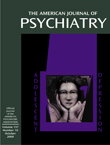To the Editor: Although the antidepressant-antipsychotic treatment combination has been found to be distinctly superior to antidepressant or antipsychotic therapy alone for psychotic depression
(1,
2), reports on the efficacy of the combination of a selective serotonin reuptake inhibitor (SSRI) with a neuroleptic in the treatment of psychotic depression
(3) are rare. We describe an apparent antidepressant response to combined treatment with citalopram and an antipsychotic in patients with psychotic depression.
We observed seven patients (five men and two women; mean age=36.7 years, SD=13.8, range=26–61) who met the DSM-IV criteria for a major depressive episode with psychotic features; six had major depressive disorder (four of these with a single episode and two with recurrent episodes), and one had bipolar I disorder. The essential psychotic features of these patients were auditory hallucinations and nihilistic, poverty, and persecutory delusions. Written informed consent was obtained from the subjects after complete description of the study. They were treated with citalopram, 20 mg/day p.o., and haloperidol, 4 mg/day p.o. The doses of haloperidol were increased to 5–9 mg/day in six patients with poor response during the first week, and the doses of citalopram were increased to 30–40 mg/day in five patients with poor response during the second week. Both the citalopram and haloperidol doses were increased in four patients. Two patients were being treated with mood stabilizers (lithium or carbamazepine) before entering the study. No other psychotropic drug was administered except triazolam (0.25–0.50 mg/day).
The Montgomery-Åsberg Depression Rating Scale
(4) and the Standardized Assessment of Patients with Depressive Disorders items for psychotic symptoms and signs (score range=0–14)
(5) were administered at baseline and weekly for 7 weeks. Clinical Global Impression (CGI) severity ratings were performed at baseline and after 7, 21, 35, and 49 days. All patients completed the 7-week trial and showed a greater than 50% improvement in scores on the Montgomery-Åsberg Depression Rating Scale at 7 weeks, as well as a reduction in scores on the Standardized Assessment of Patients with Depressive Disorders and the CGI severity scale to 0–2 and 1–2, respectively. All patients were considered responders. Overall clinical improvement was observed during the fourth week for depressive symptoms and during the third or fourth week for psychotic symptoms. Perceptual disability was restored to a more normal state, and later delusional thought waned. Co-treatment with mood stabilizers produced a similar response. Three patients reported nausea (treated for 7 weeks and for 10 and 13 days, respectively, with the antidyspepsia drugs sucralfate and metoclopramide at 10–20 mg/day on an as-needed basis), and three patients reported sedation. Mild stiffness was found in four patients.
To our knowledge, this is the first description of the efficacy and safety of the SSRI citalopram in combination with haloperidol in the treatment of psychotic depression, for which response to placebo is almost absent. Although a larger study group and controlled studies are needed, the efficacy of citalopram may be similar to that of the tricyclics in combined antidepressant-antipsychotic treatment of psychotic depression.

